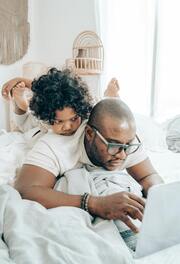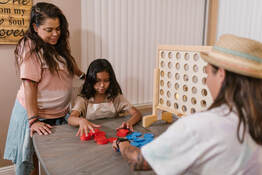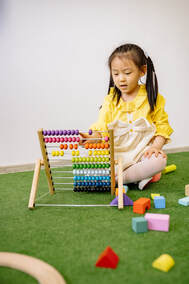|
Back to Blog
 Photo by Volodymyr Hryshchenko on Unsplash Photo by Volodymyr Hryshchenko on Unsplash Summer is here! And while that’s probably very exciting news for your child(ren), as a parent, you might be having some mixed feelings about it. It’s great to have your child home for a few months, but you know that the change of routine will be disruptive. On top of that, many parents worry about how the summer break will affect their child’s learning and development – they gained so much during the school year, and you don’t want them to forget all the progress they made. Plus, you now have to keep your child engaged and entertained all day, and it can be hard (and, let’s be real, often expensive) to find camps and other enriching activities. So today, I want to talk about how to balance all of this – how to keep your child engaged during summer, but also how to let go of your own worries and fears. Because we want you to be relaxed during the summer, too! Why summer can be stressful for parents Summer is so much fun for children and adults, but it can be a stressful time in parenting. I often hear the same concerns about summer from the parents I work with, and I can definitely relate to a lot of them myself! Some concerns you might have for your child during the summer months include: Their routines are changing – and that can cause chaos Whether or not your child’s going to be in summer school or camp, their routines could completely change during the summer. If they’re staying home all summer, then they might have different bedtimes, different wake up times, and a whole lot more unstructured play time during the day. They might also have more screen time than they and you are used to. If they are in camp, then they’re also going to have to get to new things – new places, new friends, new counselors, and so on. Understandably, many parents worry that this disruption in routine will cause chaos. They’ll lose the academic gains they made Lots of parents, including myself sometimes, also worry that their child is going to lose the academic gains they made over the school year. For most children, we’re talking about 2 to 3 months away from daily school-based learning. You might wonder, how are they going to remember everything they learned over that time? They’ll miss their friends Children also can miss their friends during the summer months, especially if you live in a larger city (or a more remote area) where they can’t just walk around the neighborhood. You might worry about how this will affect them. Will they feel lonely and sad? Will they lose their social skills? They’ll get too much screen time We all know about the worries of too much screen time on young children, but it can be so hard to adhere to those guidelines, especially during the summer. You need to live and work, too, and it can be a challenge to say “no” to screen time when you know it’ll keep your child entertained for a long time. But you’ve worked so hard all year to limit screen time, and you’re worried this will make them backtrack. How to let go of your worries and (kind of) maintain a structure I know it’s really hard, but try to let go of the worries you have about potential losses of skills and learning that might happen during the summer. There usually is a bit of a loss – teachers call this the “summer slide” – and that’s perfectly normal. If you’re super anxious about it, then you’re likely going to bring that anxiety to every interaction you have with your child. All summer, they’ll feel a heavy pressure to keep up with the same learning routines that they had during the school year, which will really make their summer a drag and likely make parenting even harder for you. Try to put yourself in their shoes. Remember that last day of school? How that taste of freedom felt when you knew you had months of leisure time ahead of you? That’s one of the best feelings in the world – let’s try to keep that feeling present for them. That doesn’t mean let your child do whatever they want all summer. As long as you’re trying your best to make sure that your child gets some sort of learning opportunities and enrichment during the summer, you’re doing alright. Figure out some type of learning routine that doesn’t necessarily mimic a school schedule, but is fun and engaging for your child. Here is one strategy I’ve been trying and it seems to be working. On my 7 year old’s last day of school she bought home folders from Spanish, Math, Reading and Writing class. I set those folders aside and put in sheets that she had from school plus some other handouts I had lying around. A few nights a week, I take them out, put them on the table and have her do one sheet from each subject. This routine, takes us no more than ½ hour depending on her willingness. At the end of this ½ hour, I feel good that she was able to get some learning in and she feels good at having completed some activities. Perhaps this is something you would like to try to? Of course, make it your own and tailor it to your child’s learning needs and capabilities. Affordable summer resources to keep your child engaged I also wanted to let you know about some other places where you can find engaging, and affordable resources that you can use to keep your child learning and entertained all summer. These resources have worked for my family and many others I know. Please check them out, and comment below if you have any others to share with the community! School resources You know those apps that your child does their homework on? Some schools will allow your child to still have access to those apps even in the summer. Yes, it’s still technically screen time, but it’s also a type of learning. Perhaps this is the kind of electronic you can have your child engage in while you’re working from home to keep them entertained. Books If you don't have access to those apps or you just really don't want to go down that road, then a learning book from your local bookstore can be an option. Some learning books will have incentives, like stickers, to help keep your child motivated to complete each page. Find a book on a topic that your child is interested in and use that as your learning material – do they like animals? Space? Literature? Community resources Most cities and towns have tons of community resources for parents and their children during the summer. The local library is a great one; most offer summer reading programs for children. Township community centers and local parks may also have special learning and extracurricular programs. Many cities, like NYC, have school lunch programs that can help with both providing a meal and getting your child around other children to play with which can help with socialization. You can look online for programs that are offered by your city or county. You might be surprised at what you find! Your own resources On top of all of that, there are also so many other enriching activities you can do with your child that don’t necessarily cost a lot of money. Go for a hike or walk at your local nature preserve. Go play in the sprinklers or fountain at the park. Do some arts and crafts projects or set your child up to do some solo coloring/reading/playdoh, etc. There are also lots of STEM-related activities that keep them learning in a playful way – I’m thinking of things like Magnatiles, building blocks, Legos, etc. There are so many options! The important thing is to keep a routine of some sort, and fill it with predictable, fun, and enriching activities like the ones I’ve listed above. You don’t need to be as strict about the schedule as you are during the school year, but having some sort of schedule/routine can be helpful to keep the body moving and the brain stimulated for both you and your child. If you need some help setting up a schedule for your child, check out my other blog post! Parenting support and workshops Are you in need of other types of support/education around parenting? Check out my latest workshop and course offerings here. If you are a therapist looking for more information to expand your knowledge and help your client, then check out my next workshop on August 24th. I’ll be hosting a CE workshop for mental health professionals in North Brunswick. More information coming in the next week or so, so be sure to sign up for the Mailing list if you are not already on it. Hope you have a great start to your summer! Thanks for reading.
0 Comments
Read More
Back to Blog
 Photo by Juan Pablo Serrano Photo by Juan Pablo Serrano If you’ve been on child development websites or scrolled “ParentTok” accounts on social media recently, you’ve probably heard terminology with the word “regulation” — terms like self-regulation, dysregulation, and co-regulation. But you might wonder, what do these words mean? Do they all mean basically the same thing, or are they different? I get it — before I was trained as a play therapist, I was definitely confused when I heard words like these. I kind of knew what they meant, but not exactly. To be honest, I felt like they were out of my wheelhouse. Let’s be real here; in my Puerto Rican/Nuyorican upbringing, no one was using words like “regulation” back when I was raised, and I think the same goes for many of you as well. But now that I’ve learned, I’m able to use these concepts to help my clients as well as my own family. In today’s blog, I want to talk about these 3 very important terms — dysregulation, self-regulation, and co-regulation — and why they matter to us as parents. I’ll go over a brief definition of each before getting into how you can recognize and help your child achieve them. What is “regulation”? It might be helpful to start with the part of these words that they have in common: “regulation.” All 3 of these terms contain “regulation,” but what does that mean? To put it as simply as possible, regulation is the ability to control something. For example, an organization might have regulations for employee behavior. There might be regulations for the standard sizes of car seats. A parent might regulate their child’s internet use. In the field of mental health, we typically apply the word regulation to emotions, thoughts, or behaviors. For example, we might help regulate our infant’s fear by holding or rocking them. You regulate your behaviors every time you display impulse control — you may stick to a budget even when you want to purchase something, you resist the urge to raise your voice or the urge to have one more piece of chocolate. The ability to regulate emotions and behaviors is generally seen as one of the most important things for psychological well-being. Dysregulation Dysregulation is the opposite of regulation. When you’re dysregulated, you’ve lost control over your emotions and behaviors. Adults who are dysregulated might shout, have angry outbursts, or not be able to stop crying. We all get dysregulated sometimes, but mental health conditions like depression or ADHD can cause some people to be chronically dysregulated. Children are still learning how to regulate their emotions, so they tend to get more dysregulated more often. This is normal and developmentally appropriate – they haven’t mastered the skill of regulation yet! Your child might be more likely to be dysregulated when they haven’t had their basic needs met — like when they’re hungry, tired, or sick. Some signs that your child might be dysregulated include:
Self-regulation Self-regulation is the ability to regulate your own emotions and behaviors. Most adults do this to some extent, although we can still have trouble sometimes. For example, you might go for a run when you’re feeling stressed, or call a friend when you’re feeling sad. Then there are also the unhealthy ways we self-regulate, like drinking or using drugs to try to feel better. You might think that young children don’t know how to self-regulate yet, but actually, even infants self-regulate in some ways. For example, many babies and toddlers try to soothe themselves by sucking on their hands and/or thumbs. A young child, or even an infant, might turn away from something that’s bothering them (like bright lights) or even turn towards you for comfort. As toddlers get older, they’re able to self-regulate in more complex ways. They might develop a little more impulse control over their behaviors, and be able to think before they act. You can also teach them new social-emotional techniques for self-regulation, like deep belly breathing or stretching. Some other ways that young children can self-regulate are:
The best thing about self-regulation is that it’s a skill you can teach your children just like any other. If they’re in school, they may even already have learned techniques in classroom SEL (socio-emotional learning) lessons. Just like you’d teach them skills like how to brush their own teeth or put their toys away, you can teach them self-regulation skills. Mindfulness is a good one to start with; there are lots of resources online and at the library that can give you ideas of how to teach children how to pause and breathe when they’re upset. Co-regulation Of course, your child won’t always be able to regulate their own emotions – they still need you to support them! This is where co-regulation comes in. Self-regulation is when your child is able to soothe themselves on their own. Co-regulation is when you support your child in regulating their emotions. Co-regulation is so important for young children. First of all, it can create bonding and attachment between you and your child. It’s a way to consistently respond to your child’s emotional needs and help them feel secure. It also helps your child deal with big, painful feelings before they’re able to do this for themselves. Co-regulation teaches children important regulation skills and provides them with comfort when they don’t know how to comfort themselves. Co-regulation can be as simple as offering a hug or a snuggle when your child is crying. Some other creative ways that you can co-regulate with your child include:
Takeaway & online parenting workshop! The terminology can get confusing, but at the end of the day, it’s just about being able to notice signs that your child is having trouble managing their own emotions — they are dysregulated — and supporting them and helping them use skills to self-soothe or calm themselves down (self-regulation and/or co-regulation). Knowing these terms can help you understand your child’s tantrums and intervene quickly. I know how challenging parenting a young child can be, especially without guidance which is why I continue to offer in-person and virtual parenting workshops for parents of children aged 3 to 8! My next workshop is a popular one and will be held on May 21st, where I’ll be walking you some key developmental milestones you should be aware of in order to help your child with their meltdowns. I’ll talk about concepts like dysregulation and how to use this knowledge to make your parenting journey easier. I’m also offering an in-person training for therapists on June 15th, where we’ll talk about how to help clients improve co-regulation between parents and children. Sign up today before the deadline. Whether you’re a parent or a therapist (or both!), I hope to see you at one of my workshops. Thanks for reading! Christine M. Valentín is a Registered Play Therapist™ who helps children 3-8 struggling with managing their emotions, Parents- who want to improve their parenting skills and Adults - who are concerned about an aging parent. As a Latina therapist, with 14 years of private practice experience, Christine loves helping people become a more confident version of themselves and develop better relationships within their family. To read her other blog posts, click here.
Back to Blog
 Photo by Ketut Subiyanto Photo by Ketut Subiyanto A common issue that many parents of young children (3 to 8) seek help from me with is tantrums. Every child has them, but that doesn’t make them any less frustrating in the moment. This can especially be true when our child is old enough to use words to express their thoughts and feelings. We think, well, if they needed something, then they’d let me know. Since, however, this is often not the case for young children, it can cause us to mistakenly believe that there’s no real need behind the tantrum and our child is just making life difficult for us. In other cases, our children may use words and tell us what is wrong, but, sometimes what they say isn’t really what the issue is - especially if they are not fully equipped to tell us what they need and when they need it. A child being able to express their needs is often much more complex than just using words. Young children are still learning how their bodies work which means they don’t always understand the signals coming from their bodies, what they mean and how to verbalize it. This is when they turn to us for help and sometimes, that helps comes in the form of a tantrum. When it does, it can be tricky to try to figure out what they’re trying to tell us! What often helps parents I work with, is a reminder about some of the basic needs their growing children has. Below are a few of the basic needs of all children and even for us as adult. When your child is having an emotional outburst or meltdown, run through them in your mind and see if they apply. The solution to reducing their tantrum might be simpler than you think! Hunger Some children are able to recognize that a rumbly tummy = hunger. But this isn’t always the case. Your child may be too young to notice and to communicate hunger signals. Children who are having tummy problems can also have a hard time differentiating between being hungry and having an upset tummy. Instead of talking with us, we may then see a tantrum. If your child is having a tantrum ask yourself, “When was the last time they ate, and could an unmet hunger need be at the root of their tantrum?” Thirst Water is a basic human need for survival! But even as adults, we often misread thirst signals, so it’s not surprising that younger children often don’t realize they’re thirsty until they’re absolutely parched. And, being too thirsty can cause meltdowns, too. Just like with hunger, ask yourself when was the last time they had something to drink. Having a drink handy at all times (i.e. water bottles and juice boxes) can allow you to offer it to your child regularly instead of waiting for them to tell you that they’re thirsty. Support through illness As parents we know that when our child is not feeling well, they can get cranky, irritable and have tantrums in one form or another. Supporting a child through an illness can look different for many of us. I know for me, I automatically go into anxious mode at the thought of getting sick myself and being out of work. The ability to support my child, as well as myself, is vital when we are dealing with the basic need of nurture. Prioritize their recovery vs trying to stick to the “standards” you have about their daily structure and nutrition. For example, in my household, there’s a running joke that my daughter loves it when she is sick. Why? Because this is when I let go of the "should's" - she shouldn’t be watching too much tv; she shouldn’t be eating too much of x, y and z foods. Instead, I prioritize her rest, hydration, and nutrition. Meaning, when she’s sick, she gets to watch TV for hours and drink lots of juice (i.e. not watered down). Sore throat? She gets ice cream! Would a nutritionist or her pediatrician agree with this method? Don’t know and honestly, I don’t care. At this point, I do what works for me and my family. Rest, isolation (so everybody else doesn’t get sick! 😛) and hydration! These are the basic needs I take care of to prevent meltdowns. Connection with you Lastly, children need to feel connected with you – it’s as basic a need as food or water. But we all know how hard it can be to pencil in one-on-one time into our schedules. This is especially true when we have more than one child, we’re a single parent, or there’s just a lot going on. Not only is there not enough time for connection some days, but often as parents, we’re simply too drained. When we can figure out how to make time for one-on-one connection, however, it can pay off tremendously. Now, I’m not saying you have to carve out hours of your afternoon to do special activities together every day. All your child needs is to feel connected with you, which really means capitalizing on the time that you and your child already spend together. For example, you can meet their need for connection while you’re walking/driving to or from school and playing games like I Spy, or when you’re eating breakfast or preparing their lunch and talking about a show/program they enjoy watching. And connection isn’t just about having long, deep conversations – you can also connect nonverbally. Make eye contact and smile; Position your body in a way that lets them know, “You have my full attention!”; Give them a gentle touch on their back to let them know you are aware of their presence and love them. Takeaway & online workshop! Thinking about these things when your child is having a tantrum can feel trivial or “silly” – but they’re often the culprit, and we can help our children a lot by paying attention to these needs. Being mindful of the last time your child has eaten, had a drink, or slept – and if they might have a cold coming on can be extremely helpful. While I know this can seem too basic and that life is sometimes much more intricate than tending to these needs, know that being mindful of such things often gets lost in the day to day responsibilities. Plus, as our child grow, we rely more heavily on their ability to verbalize their troubles. Remembering the basics will allow us to make a tangible change if we’re aware of it. And when we are made away of it and implement those changes, it can make our lives a whole lot easier! But, I understand how parenting life can be so overwhelming and implementing a change can be daunting without the right guidance. This is why I've recently expanded my services to include in-person and virtual workshops to educate and remind parents about this! If you are looking for some first-hand tips and feedback on how you can better support your child's emotional well-being and learn how to make the most out of one on one time, then consider attending my next in-person parent workshop on 4/30! I also am hosting my popular virtual workshop on April 16th about tantrums, where I’ll review what you need to know about your child's development and how to help your 3 to 8 child with tantrums and meltdowns. I hope to see you, whether it’s in-person or online. Thanks so much for reading! Christine M. Valentín is a Registered Play Therapist™ who helps children 3-8 struggling with managing their emotions, Parents- who want to improve their parenting skills and Adults - who are concerned about an aging parent. As a Latina therapist, with 14 years of private practice experience, Christine loves helping people become a more confident version of themselves and develop better relationships within their family. To read her other blog posts, click here.
Back to Blog
 Photo by Keira Burton Photo by Keira Burton Do you feel that your child is very sensitive? And for purposes of this post, I don’t necessarily mean sensitive to emotions. I’m talking more about sensory sensitivity, or a heightened awareness of certain external stimuli. This might look like getting frustrated in loud spaces or not liking the feel of certain clothes on their skin. If your child is sensitive in this way, they’re not alone. Sensory sensitivity is a super common phenomenon among younger children. Sensory sensitivities are more common in neurodivergent children, like those with autism or ADHD – although some neurodivergent children don’t have any issues. In addition, these children aren’t the only ones who are sensitive to certain stimuli. It’s estimated that up to 16.5% of the general population lives with some sort of sensory processing challenges – meaning that it’s very normal and common! In fact, I would say that most children are sensitive to something. For example, they might hear a loud motorcycle zooming by and cover their ears, or not want to touch something because it feels “icky.” It’s completely normal to be sensitive to some things, both for children and adults. Just because your child is sensitive to certain sensory inputs does not mean that they have a disorder (like sensory processing disorder). Sensory sensitivities vary across individual children. Some children may be sensitive to certain stimuli, while others may not (or might be sensitive to different stimuli). There is a point at which these hypersensitivities could fit the bill for a diagnosis and extra support, so it’s important to talk to your child's doctor and/or a mental health provider if you’re concerned. But, in general, if it isn’t impairing their functioning (like their learning at school or their ability to make friends), then it’s probably within the “normal” range. In today’s blog, I’m going to go over 4 things that you may not have known your child is sensitive to. I’ll also give you some tips you can use to help your child when they’re upset about these things. Sensory sensitivities your child may have 4 different stimuli that your little one might be sensitive to can include: 1) Sounds Most children are sensitive to some sounds, especially those that imply danger. For example, your child might be afraid of the sound of thunder or cover their ears when they hear shouting. Think for a moment about when you are watching a horror movie or a tense TV show. When you pay close attention, you’ll notice there are sounds that tell us that danger is coming before we actually see it appear on-screen. Like the music ramping or changing melody or even hearing footsteps. As adults, it’s possible we may have learned to tune this out – but children can pick up on these “scary” sounds a lot easier than we can. Some of the things you may notice your child do when they are hyper aware of a sound can include suddenly covering their ears, running away, or telling you that they feel scared. They might also ask you to turn the TV off (or turn on the lights) before anything really scary jumps out at them on screen. They might even start having a tantrum. If you find yourself feeling confused in the moment (because the sounds don’t bother you), take it as a sign that your child is picking up on sounds that imply danger is coming and is probably scared. 2)Temperature Temperature is a big one for young children, and you may have noticed that they seem to have a different internal thermometer altogether sometimes. When you feel nice and toasty, they may tell you that they feel cold. Or you might feel chilly on a cloudy day, only for them to tell you that they want to jump in the pool. Strong reactions or insistence to have things their way when it comes to temperature of water, food, etc., can you be an indication they are sensitive. 3)Light Some children are sensitive to light. This may be light in general – for example, they may become very upset when the lights come on as they’re waking up – or only certain types of lights, such as the flashing lights of a police siren/ambulance. You might see them squinting or closing their eyes; they might ask you to turn the source of the lights off. If the light source continues to bother them, you may also notice a tantrum. 4)Texture Many children are also sensitive to textures, whether it’s the texture of their clothes or different foods. Even if they love the taste of the food, they might hate the texture – which can be confusing sometimes for us as adults. I remember, as a child, I hated a hot cereal called Farina. My Abuela would make it most mornings, with cinnamon and milk (nice and sweet) and while my siblings loved it — I just could not get over the texture! To this day, I can’t bring myself to eat it despite how good it smells. ;) In the same way, your child might be resistant to certain foods because they’re sensitive to texture, not because they don’t like the taste. And that’s typically not something that they can simply “get over” and for those who are non-verbal, something they can’t even articulate. How to help your child with sensory sensitivities Sensory sensitivities can be so hard to deal with because it often feels like they come out of nowhere. But in reality, it’s likely that your child is giving you signs that they’re uncomfortable or overstimulated way before the meltdown/tantrum happens. 1) Observe and Pay Attention Try to observe and listen to what your child is communicating, both verbally and non-verbally, and honor their needs the best you can. This often involves letting go of our own agenda, vision, or – often – need for perfection, and simply meeting our children where they’re at. I completely understand that this is often easier said than done. Verbally, it’s pretty simple, but you may not pick up right away on the fact that they’re saying these things because of sensory sensitivities. For example, a toddler might say things like, “I don’t like it,” or “Yucky,” or “I don’t want to wear it.” These statements confuse us sometimes as parents, especially when it’s about something they’ve done a million times before (for example, if they suddenly tell you they don’t want to wear something that they’ve already worn). But your child may be trying to tell you that they’re overwhelmed with the sensory stimuli. 2) Pay attention to non-verbal cues Flailing, squirming, or scratching are a few examples of non-verbal cues. You might also notice your child turn away from certain stimuli – for example, covering their ears or closing their eyes. These are all signs that they may be sensitive to something in their environment. 3) Honor what they need When we do pick up on the fact that our child is sensitive to certain sensory input, it’s important to honor where they’re at – even if we don’t necessarily understand. Here’s an example. My daughter absolutely hates jeans. She always has. The minute that denim texture hits her skin, she flails it off. But, I love how jeans look and I love to see her dressed in "cute" jumpers and a jean jacket. And, while I could push my own agenda and "mandate" her to wear the jeans for our family portrait, not only would I be upsetting her, but I’d be signing myself up for hours of tantrums and overall dysregulation for both her and myself. So...I gave up on jeans and I make sure to tell my relatives not to buy her anything jean material. For me, it’s worth it. 4) Your Child Is Not Alone I’ve heard similar stories from the parents I work with and understand that each child is unique and has their own needs. I recall one mom I spoke with who told me how her son would get really upset every morning when it was time to wake up. Feeling perplexed and annoyed by his intense, angry reaction every morning, she put her observation hat on and figured out that this reaction was set off whenever she turned on the bedroom lights. While her son did request she did not turn on the lights, it was dismissed because she didn't realize how much of a sensitivity it was for him. Once she and her child figured out how to modify the morning routine, mornings became much smoother for the both of them. Another parent I know uses headphones to help ease her child’s noise sensitivities at large gatherings. Does a pair of big headphones look “cute” with her dress? Absolutely not. Maybe people will even judge or critique. But, the headphones help her child cope better in loud spaces which means the parents can enjoy themselves and not have to sacrifice their fun time and worry about their child being uncomfortable. Sometimes, being able to put aside our own parenting goals/agendas and simply attuning to what our child’s needs can make the whole parenting experience a lot easier. That’s all I got for this month but if you want more insight on how to help your little one, check out my other blogs or join me at one of my online parenting workshops! On March 20th, I’ll be hosting a virtual workshop on how to help your child with meltdowns and other behaviors. This workshop is specifically designed for parents of children aged 3 to 8 who want to learn how to manage a demanding or bossy child, decrease opposition, and reduce aggression. You can sign up here. Hope to see you there! Thanks for reading! Christine M. Valentín is a Registered Play Therapist™ who helps children 3-8 struggling with managing their emotions, Parents- who want to improve their parenting skills and Adults - who are concerned about an aging parent. As a Latina therapist, with 14 years of private practice experience, Christine loves helping people become a more confident version of themselves and develop better relationships within their family. To read her other blog posts, click here.
Back to Blog
 Photo by RDNE Stock project Photo by RDNE Stock project Love, according to the Oxford dictionary, is "an intense feeling of deep affection." Two years ago, I featured a 3 part series related to how parents and children and enjoy quality time with each other through various simple, interactive games. Games that don't require you to purchase anything and that you can even do while waiting on the long supermarket line. Below is a summary of that 3 part series, including the games that I most often recommend to the parents I work with who have children between 2-8 years old. Games that Include Making Eye Contact- Looking into your child's eyes is a form of non-verbal communication that is intimate because it allows us to be present with one another. A few eye contact games that I often recommend in my practice include:
Games that Include Touch- Games that involve touch are important for a child and for us as human beings because research has shown how infants actually thrive when touched and how nurturing touch allows us to feel connected and loved. Below are a few games/activities that involve touch.
Activities that Include Verbal Affirmation- For those of you familiar with the 5 love languages, the concept behind words of affirmation is to verbally express how much we love and appreciate your loved one. For kids, it can look a bit different depending on the age but here are a few suggestions that can be used throughout your daily routine. 1). Write a note/draw a picture - in case you've missed it, food marketers now sell snacks with wrappers you can write on. See what I'm referring to here. These opportunities to write or draw a picture for your child while you are away from them can reassure them that even though you are apart, you are still thinking about them. Don't want to buy these kinds of items? I hear ya! Use post-it notes or good old-fashioned paper and tape. It's not about the item vs the note/drawing. 2). State what you love about them - during mealtime or bedtime, finish the following statement: I love your________ (eyes, ears, smile, laugh) because _________ (your eyes sparkle so bright, your ears hear so well, your smile lights up a room, your laugh is so contagious). The purpose behind making such a statement is to highlight the greatness of your child. Avoid commenting on what they are wearing or how their hair looks. Instead, focus on who they are. This can take some practice to get used to doing but with practice it is doable. If you find yourself struggling with this one, simply state what you notice about them. For example, I love your brown eyes., I love your big smile., I love your loud laugh. 3). Sing a Song - for some parents, it can be hard to verbally express their love directly. This is where singing and dancing can come in. Under the guise of the lyrics in the song, a parent/guardian can lip-sync the words of the song to the child. The key to doing this is to make sure you are looking and pointing to your child so they know you are "singing" to them. Depending on your child's age, a lullaby can also help; Think, Twinkle, twinkle little star. Non-verbal Cues to be aware of with the games mentioned: For eye contact games/activities: Some children can be uncomfortable making eye contact due to various issues. If you find your child is not engaging in the games I mentioned, don't push the issue. Just work around it if possible or if you believe it is better, don't play these games at all. For physical touch games/activities : some children are sensitive to touch. For some, touch can be too ticklish or painful which can dysregulate them. For others, the proximity of having someone close to them may be triggering. If you find your child is not playing along and instead tries to hit you or to turn it into a different game, it could be a sign that they are uncomfortable and it may be best to switch up the game or not play at all. For activities that involve affirming your child: being able to verbally express yourself as a parent/guardian requires your patience and insight into knowing what you are capable of giving. It will also require you to not expect anything in return from your child. Words of affirmation are meant to celebrate your child's greatness without expecting anything in return. If you expect our child to reciprocate what you are saying, then it will change the nature of the interaction from one of unconditional love to conditional love. For some additional tips on how to play games with your child, check out this blog post I wrote. Thank you for reading and I wish you and your loved one a Happy Valentine's Day! Christine M. Valentín is a Registered Play Therapist™ who helps children 3-8 struggling with managing their emotions, Parents- who want to improve their parenting skills and Adults - who are concerned about an aging parent. As a Latina therapist, with 14 years of private practice experience, Christine loves helping people become a more confident version of themselves and develop better relationships within their family. To read her other blog posts, click here. To check out her latest workshops or courses, click here.
Back to Blog
Death, Divorce, and Loss: How to Discuss Difficult Topics with Children, and Why It’s So Hard1/8/2024 *A Personal Note from Me to You* As I write this post, I realize it may be difficult for some of my readers to read and/or to process as I myself am noticing a sad response my body is experiencing as I write these words. And, while I can simply discard this post and talk about things that won’t cause me or you to feel “some kind of way”, I would be doing a disservice to the many children who need us, as parents, to learn how to talk about tough and uncomfortable topics. Therefore, please be mindful of your feelings as you read the words on my blog this month and if you need to take a break from reading it, go ahead. It will be here when you are ready. 🙂 Death, Divorce, and Loss: How to Discuss Difficult |
This Site is not intended to provide psychotherapy advice. The Site is intended only for use by individuals in search of general information of interest pertaining to anxiety, depression and related topics. Content is not intended to replace or serve as substitute for professional consultation or service. Contained observations and opinions should not be misconstrued as specific counseling advice.




